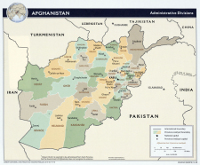Coalition forces defeated a Taliban attempt to storm a major airbase in eastern Afghanistan earlier today.
A small team of Taliban fighters, estimated at six to eight men, launched a complex attack against the main gate of Jalalabad Airfield. The Taliban “attacked Jalalabad airfield this morning using a vehicle-borne improvised explosive device, rocket-propelled grenades, and small arms fire,” the International Security Assistance Force stated in a press release.
The attack began when a suicide bomber detonated at the main gate in an attempt to create a breach in the security perimeter. After the suicide bombing, the Taliban assault team attempted to enter the base but was repelled during a firefight with US and Afghan security forces manning the perimeter.
The Taliban later claimed to have entered the airfield and also claimed to have killed “dozens” of US and Afghan troops, but ISAF dismissed the reports and said only two troops were wounded during the attack.
“The airfield’s perimeter was not breached, and several insurgents were killed during the attack,” ISAF stated in a press release. “Two combined security force members received minor injuries; there are no reports of civilian injuries.”
The Taliban wildly exaggerate the effects of their attacks and resultant Coalition and Afghan casualties. In propaganda statements released on their website, Voice of Jihad, the Taliban make daily claims that scores of soldiers are killed and dozens of vehicles are destroyed.
The Taliban also stated that the attack was designed to “send a message to David Petraeus,” the newly appointed commander of ISAF who replaced outgoing commander General Stanley McChrystal, who resigned week, Al Jazeera reported. General Petraeus, who led US forces during the ‘surge’ in Iraq in 2007-2008, said during testimony to Congress yesterday that he would review the existing restrictive rules of engagement.
The Peshawar Regional Military Shura, one of the Afghan Taliban’s four major commands, directs activities in eastern and northeastern Afghanistan. Abdul Latif Mansur is thought to currently lead the Taliban’s Peshawar shura. It was led by Maulvi Abdul Kabir before his detention in Pakistan in February 2010.
A Taliban group known as the Tora Bora Military Front operates in Nangarhar and has been behind a series of deadly attacks in the province. The Tora Bora Military Front is led by Anwarul Haq Mujahid, the son of Maulvi Mohammed Yunis Khalis, who was instrumental in welcoming Osama bin Laden to Afghanistan after al Qaeda was ejected from Sudan in 1996. Pakistan detained Mujahid in Peshawar in June 2009.
Nangarhar is a strategic province for both the Taliban and the Coalition. The province borders the Pakistani tribal agency of Khyber. The majority of NATO’s supplies pass through Khyber and Nangarhar before reaching Kabul and points beyond.
Today’s assault on Jalalabad Airfield is the latest failed Taliban attempt to penetrate the security of a major air base. The first such attack took place on May 19, when a Taliban assault team attempted to storm the US airbase in Bagram in Parwan province, but was beaten back by US forces defending the base. An estimated 30 to 40 Taliban fighters carried out the assault. During the attack, 16 Taliban fighters were killed, including four suicide bombers; a US military contractor was also killed.
The second attack took place on May 22, when a Taliban assault team launched a coordinated attack against Kandahar Airfield, the largest base in southern Afghanistan and a major hub for operations in the south. The attack was repelled by Coalition forces, but no estimate of the size of the Taliban force was released.
The Taliban attacks are designed to break the will of the Coalition and demonstrate that Taliban forces can strike in the heart of Afghanistan as well as along the periphery. Earlier this month, the Taliban announced that they would begin operation Al Faath, or Victory, on May 10. The Taliban said they would target Coalition and Afghan forces, their bases, the Afghan government, security and logistics companies, and anyone supporting the “foreign forces.”








